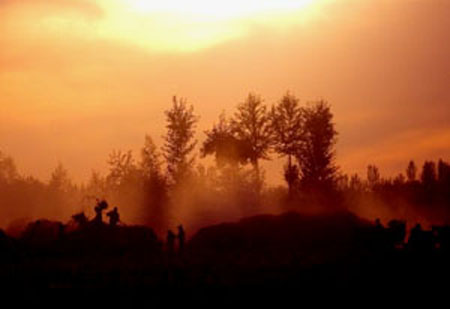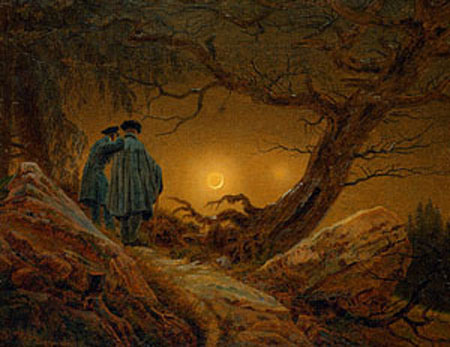 |
Organic Society
The Steps of an Organic Relationship
Plinio Corrêa de Oliveira
There is something in the human spirit today that always tends to present reality in a complicated way. People try to give the impression that they are important, and to this purpose they complicate things that are normally simple. I believe that this is one of the fruits of the Revolution.
I follow an opposite method of exposition. I try to present simple things as they are, and to reduce complicated things to simple ones. Both complicated and simple things should be presented as clearly as possible so that they can be understood by greater numbers of people.
The organic relationship is one of these simple things. It is so simple that it can be disappointing.
I don't remember the author of a novel I read when I was a child - I think it was Jules Verne, but someone told me that he didn't write on this topic. In that piece of fiction, the writer supposes that due to some extraordinary meteorological occurrence, a small part of Alaska separated itself from the continent and became a floating island.
On that island were persons from different countries who had been attending some international event there when the separation took place. Some families of the area were there in their homes. Also, a group of traveling circus performers was there. The island was able to provide all the needed food, water and shelter so that this diverse group could live without too many material concerns. The novel then goes off in another direction. Let me, however, take this situation and imagine the social relations that would start to be established in that small new human group.
Let me set up the supposition that all the inhabitants of that new island would be good Catholics, adverse to the errors of the Revolution.
In a situation like this, where almost all previous bonds have been broken and no obedience is due to any official authority, what would happen? What would be an organic development of a new society where each person would be free to do what he wanted to fulfill his duty?

Some persons like to begin work at dawn, above
Others prefer to contemplate problems at night, below

Two Men Observing the Moon, David Caspar |
In some things this group of different peoples would have affinities, raising goodwill; but since each would have his own personality, very different from the others, they would also have marked differences, raising antipathy. Being good Catholics, they would try to do what Charity obliges in such conditions, that is, to establish cordial relations with one another. However, given their different defects and qualities as well as their different habits and customs, some frictions would inevitably arise.
One example: one person likes to study at night and, therefore, sleep later in the morning. He feels a greater liberty of mind to resolve difficult intellectual problems at night. Another, however, likes to begin work at dawn because he feels inspired by the awakening of nature, it is a joy for him. Let us imagine that both had to work together for some reason. As good fellow Catholics, they would make an effort to adapt to each other. For one month, both would arise early, the next month they would rise later.
But it is inevitable that the person who is doing the opposite of his inclination will have some negative thoughts: "Because of this man I have a headache, since I always get one when I have to wake early. Why should I have to bear this? Just so he can be up at dawn, which seems absolutely senseless to me. Still worse: Now I have to put up with this for a whole month to please him."; Then comes his turn to sleep later, and it is the other who complains. It is inevitable, and such things can cause friction and difficulties.
There are countless things like these that are part of every day human relationships. However, if the persons have a certain measure of virtue, they end by becoming accustomed to each other's way of being. They find a way to live together that is bearable for both. From this sprouts a relationship which - please note - is artificial. It results in an arrangement that results from the resolution of many frictions and difficulties. It is an adaptation of personalities that is made when Catholic virtue is present. If they don't have virtue, there will be all kinds of enmity that can end in violence or even murder. This adaptation is the first degree of a good relationship.
After they have lived this way for a time, they notice that the qualities in the other person are more significant than the defects. This leads each one to analyze and admire the other's qualities, which generates benevolence. It is second degree of the living together.
After this goodwill is born, the habit of being with the other and enjoying his company comes. This habit of relationship becomes second nature, and a strong bond of friendship forms.Imagine this organic process being repeated among all the inhabitants of that island. The link that would bind them together is one of the most pleasant things that can happen in society.
If one morning that small island would somehow find itself returned to the territory of Alaska, the people who had developed this strong relationship would feel they were different from the other Alaskan inhabitants. They would not have the strong bound of friendship with the others that they enjoy with their island companions. They would have to re-insert themselves into the life of Alaska; but in this process, they would do their best to stay together, to meet together as much as possible so as not to lose that special friendship.
This supposition allows us to see how an organic relationship is formed, with all working through difficulties and making adaptations that cause them to curb their spontaneity in certain situations under the inspiration of Catholic charity.
Adapting to the defects of others, developing the spirit of goodwill toward one another, and then forming the habit of the pleasure of relationship, these are the three phases of the organic convivium, or living together.
In what points is this process organic? It is organic when it acts according to the nature of things; but only according to the correct nature, not the decadent nature corrupted by original sin. Acting uprightly, a man can correct his own defects of nature and help others to correct themselves.
The defects of nature normally repel. But man's condition demands that he live in society. Since he has to be in relations with others, either this relationship becomes a hell or it demands that he control himself and adapt to the others. Even if initially it is an artificial situation, our nature after original sin requires that we act in this way.
To be upright, we have to tame and conquer the decadent and twisted nature that exists in each one of us. The process is organic because it follows the correct nature.
If we do this, what will develop will be friendship and the desire to stay together, which constitute the perfection of the human relationship.

Posted February 8, 2007

  | | Prof. Plinio |
Organic Society was a theme dear to the late Prof. Plinio Corrêa de Oliveira. He addressed this topic on countless occasions during his life - at times in lectures for the formation of his disciples, at times in meetings with friends who gathered to study the social aspects and history of Christendom, at times just in passing.
Atila S. Guimarães selected excerpts of these lectures and conversations from the trancripts of tapes and his own personal notes. He translated and adapted them into articles for the TIA website. In these texts fidelity to the original ideas and words is kept as much as possible.

Related Topics of Interest
 What is Organic Society? What is Organic Society?
 The Moon and its Halo The Moon and its Halo
 The State Must be Subordinate to the Church The State Must be Subordinate to the Church
 R-CR in the Tendencies, the Ideas and the Facts R-CR in the Tendencies, the Ideas and the Facts
 Questions on Ecology Questions on Ecology
 Choosing Spouses: a More Organic Solution Choosing Spouses: a More Organic Solution

|
Organic Society | Social-Political | Home | Books | CDs | Search | Contact Us

© 2002- Tradition in Action, Inc. All Rights Reserved
|
 |
|